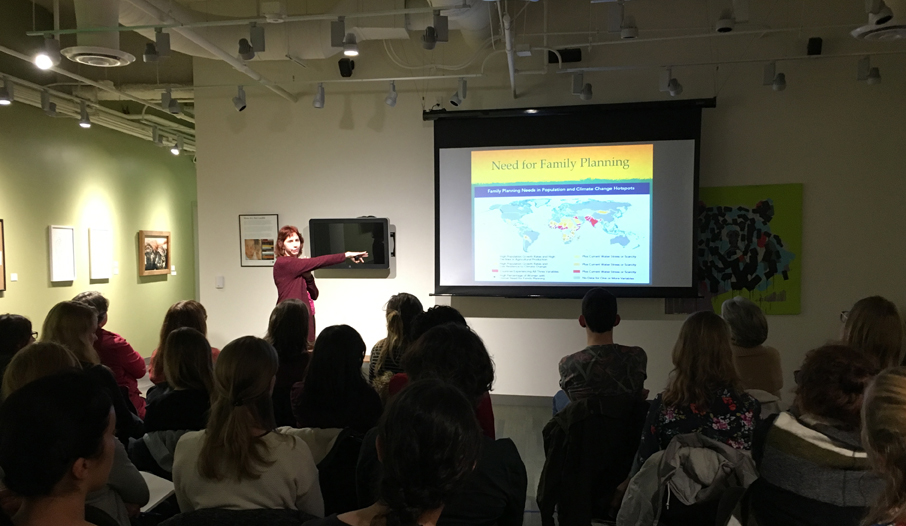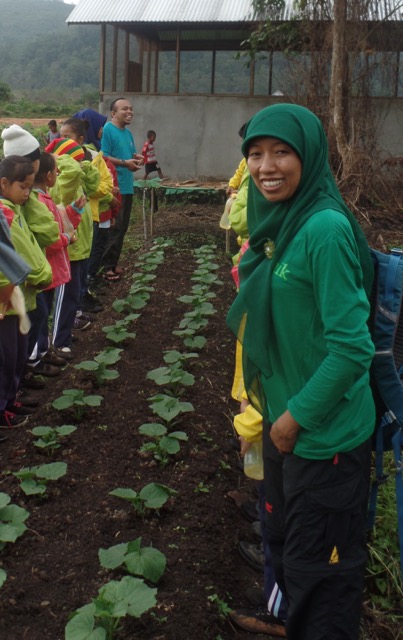
By Suzanne York
How supporting women’s rights can help the planet
It was a packed house for WEN’s first event of 2017 at the San Francisco Department of the Environment, as people came to hear my talk on how supporting women’s rights can also ultimately help the planet.
The theme of the presentation was how a rights-based, multidisciplinary approach that empowers women and protects nature is urgently needed to address our serious global environmental and social problems.
A development model known as population, health, and environment (PHE) offers a holistic approach for supporting human rights and the rights of ecosystems to flourish. The PHE model goes beyond meeting the needs for contraception, reproductive health and general healthcare. It also incorporates conservation and management of the local environment.
Saving the rainforest with a stethoscope
In a remote pocket of Indonesian Borneo, a small organization is working with local communities to improve human health and protect a fragile environment.
Alam Sehat Lestari, which translates to “health and nature everlasting” and goes by the initials ASRI, works in the town of Sukadana and surrounding communities, which borders Gunung Palung National Park, home to an estimated 2,500 orangutans. Though community members by and large want to protect the forest and understand its value, poverty has driven many to take up illegal logging in order to meet basic needs. In 2015, rapid clearing of forests in Borneo for wood and palm oil plantations contributed to horrific fires that threatened nature and human health.

ASRI is creating change for good through a process its organizational founders refer to as “radical listening.” Perhaps what is most radical about this approach is that the voices of the community have been listened to loud and clear.
ASRI’s founders – Dr. Kinari Webb, Dr. Hotlin Ompusunggu, and Dr. Antonia Gorog – spent hundreds of hours in talks with community members to understand their needs. Though many people valued the park, the only way to meet their basic needs was to log the forest. Poverty was – and still is – the driving force, even though the community knew that the Gunung Palung forest is their watershed and is needed to grow rice and other crops, and without it they would face more floods and disease. For most of the local people, they have an income of less than $1 a day, and illegal logging is their best option.
By implementing their radical listening approach, ASRI’s women leaders heard the community ask for health care, ambulances, mobile health clinics, and organic farming. ASRI also saw that using an integrated health and environment development model was needed. According to Dr. Ompusunggu, the clinic was created to address short-term needs for long-term well-being for the people and also for nature.
The ASRI leaders call it “saving the rainforest with a stethoscope.” ASRI came up with a plan to offer a variety of payment options for healthcare services. This includes cash of course, but also paying with seedlings (to support reforestation), handicrafts, labor, and even organic manure. This flexible payment plan offers options people didn’t have before and is getting healthcare to those who need it most.
The clinic provides both medical and dental health services, which includes eye care, immunization, and birth control. In the crowded waiting area, ASRI staff give weekly health and environmental conservation presentations as people wait for their appointment.
Making the connections in our own backyards
There is also a strong case to incorporate the PHE approach in the United States. For example, Texas and Florida have fast-growing populations, weak reproductive rights and face increasingly severe impacts from climate change.
Even here in California, a state considered a leader on environmental and women’s issues, we can better support linking human health and the environment for more resilient communities.
The sad reality is that every day products are damaging our health, especially the reproductive health of both women and men, and damaging our environment.
Toxic chemicals are all around us – from paint, plastics, pesticides, personal care products – and negatively affecting human health, particularly women’s reproductive health.
How does the air we breathe and the products we use affect our bodies? Here are just a small number of ways that toxic chemicals alter people’s bodies:
- infertility
- reduced sperm count and quality
- alterations in ovarian function and menstruation
- endometriosis
- altered fetal development
- miscarriage and pre-term birth
- altered prostrate development, breast development and puberty onset
This impacts not only women, but also men and children. Toxic chemicals are endocrine disrupters that alter normal hormone functions and are linked to the reproductive health issues listed above. According to the Centers for Disease Control, the majority of women have toxic chemicals in their bodies.
In the face of increasingly severe climate disruptions and environmental degradation, we need to do all we can to strengthen and invest in women’s rights – and human rights – and thereby empower people to be able to take care of themselves, their families and nature.
Suzanne York is a WEN board member and director of Transition Earth.
